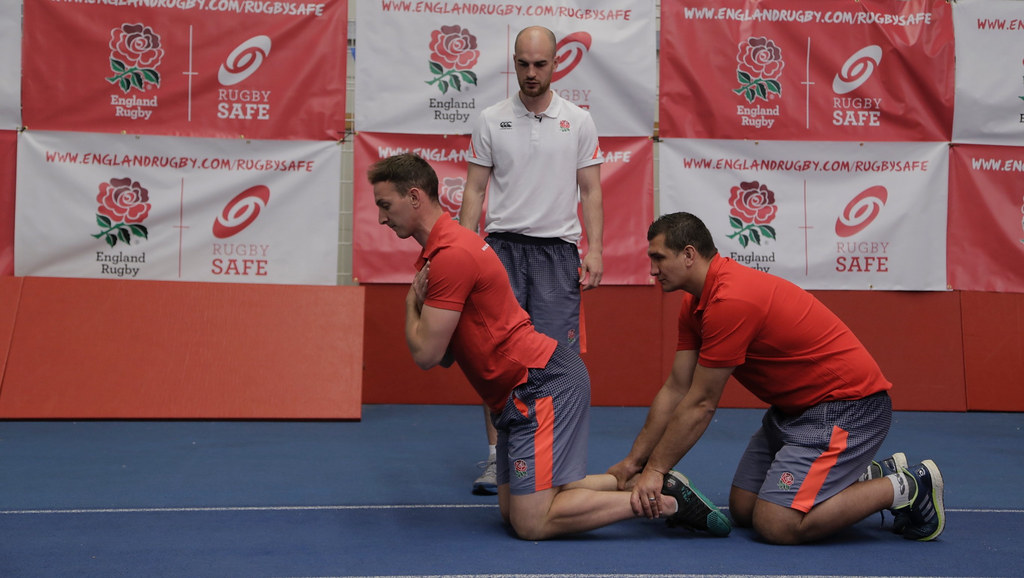A major new injury-prevention programme based on research from the University of Bath is set to launch at the Rugby World Cup 2019, with the showcase event set to raise awareness and accelerate its use globally.
World Rugby is adopting Activate, a simple and dynamic exercise programme with proven injury-prevention benefits, ahead of the showpiece tournament as part of its commitment to the game leading the way in evidence-based injury-prevention.
Global impact
Research co-led by England Rugby and the University of Bath has shown that Activate can reduce the risk of soft-tissue injuries by 26 and 40 per cent and concussion risk by 29 and 60 per cent in youth and adult rugby players, respectively. There may be greater reductions in the risk of these injuries if players use the programme as regularly and frequently as is practical.
A core component of World Rugby’s Rugby Ready programme, Activate is now being rolled-out across unions and regional associations via the international federation’s global network of qualified educators and trainers, who will build delivery capacity within union coaching networks. Major programmes have been run in Africa, North America and Oceania as the rollout continues.
The programme is also available in 11 languages online via World Rugby’s Iris coaching resource where supportive educational materials, including video and cue cards, can be accessed to help implementation.
World Rugby Chairman Sir Bill Beaumont said: "As the game’s global governing body, we continually strive to ensure that the game is simple, enjoyable and safe to play as possible. Activate is an example of that commitment – a research-led, proven injury-prevention programme that can be implemented at any level of the game, anywhere in the world. It has the potential to be a game-changer."
Professor Keith Stokes from Bath’s Department for Health added: “The research underpinning this programme required extraordinary commitment from a large team of staff and students at the University, as well as the schools taking part in the study.
“That the findings of the studies were positive was pleasing, but the real test of research like this is whether the programme is accepted and implemented by key partners. To see Activate rolled out, initially in England by the Rugby Football Union, and now globally by World Rugby is incredibly rewarding and we are pleased to have played a part in reducing injury risk in rugby.”
The objective of the protocol is to lower the risk of injury by encouraging coaches and players to regularly integrate Activate exercises into their training sessions and pre-match routines. There are four different versions of the exercise programme: an adult version and three age grade versions and each programme consists of a number of progressive phases, which should be undertaken for a set time before moving onto the next.
World Rugby Chief Medical Officer, Dr Martin Raftery said: "World Rugby works continually to optimise approaches to managing player welfare across all levels of rugby. The Activate programme is another example of this ongoing commitment, which is particularly important because of the emphasis on reducing the risk of injuries across community levels of the game. The research so far has demonstrated that the exercise programme can help to reduce injuries in youth and adult rugby."
Activate developer and World Rugby researcher Dr Mike Hislop added: "In addition to having proven injury-prevention benefits, by reducing the amount of time missed from rugby because of injuries, Activate can contribute to improving player performance and boosting the chances of team success. We hope all coaches and players understand the significance of this programme and incorporate the exercises into their training and pre-match routines."
Activate consists of simple exercises designed to improve general movement control, muscle activation, strength and power. There are also several neck exercises to develop stability and mobility of the head/neck region; it is thought that these exercises may help to reduce the potential ‘whiplash’ effects that can occur with concussion.
Rugby players, parents and coaches can visit www.worldrugby.org/playerwelfare to download the free Activate resources, including a useful online ‘virtual’ training course.
Bath's involvement in this work led to rugby research from the University being recognised last year by Universities UK for its #MadeAtUni campaign. The University was also awarded the inaugural MJA Award for its promotion to media of the original study in 2017.

